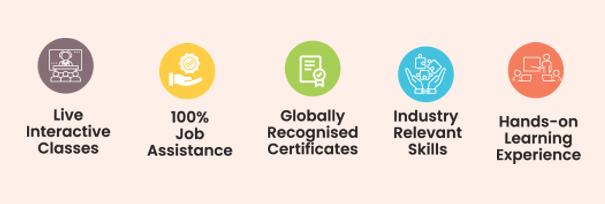Businesses today have taken to migration of their architecture and infrastructure to become more in line with the data-driven and the cloud-native era that we are a part of. Hence, terms such as the likes of containerization, container orchestration, and cloud computing have become more talked about and well-known on multiple levels.
In all the vogue terms mentioned here, some further aspects have truly stood out, Docker and Kubernetes being two of them. These two technologies have undoubtedly changed for better how we develop as well as deploy software.
You will want to have your concepts clear and yourself comfortable with Docker and Kubernetes especially if you are either a product manager, developer, data scientist or someone in the related work role. Both of the said technologies will make your job easier while giving you an added edge over your competitors for the job that you are at.
These are testing and tricky times. Hence, one should always have their best foot forward to ensure their job is secure and their future does not hold any dodgy phases. Kubernetes is a spectacular container orchestration platform while Docker is a containerization platform – both of which have come to be known as fundamental tools when we talk about taking one’s career prospects further.
Docker and Kubernetes – The Complete Guide
Our blog on Docker and Kubernetes is written with the end purpose of helping you understand more about these two platforms which has created a new wave of change and enhancement in the field. There are a thousand things you can study about and then a thousand more you will still learn after becoming certified.
Here are some of the central topics we will explore in this blog for a clearer picture:
- What is Docker & why should you use it?
- What is Kubernetes & why should you use it?
- What is the central line of difference between Docker and Kubernetes?
- Why are Docker and Kubernetes better together?
What is Docker & why should you use it?
The job of this platform is to basically aid multiple people who are working on the same project to run their individual applications in that very environment. And all this can be done without any OS issues or any sort of dependencies. The reason for this is simple, Docker is providing its very own OS, making things supper easy for its users.
Docker is a leading containerization platform where all your applications and all its dependencies will be packed together to form docker container. Creating, running, and deploying applications has become much easier with the help of Docker containers.
Dockers have been time and time again compared to VMs (Virtual Machines) and have almost always come out on the top.
Docker Certification Training Course
What is Kubernetes & why should you use it?
Kubernetes is a decidedly commanding CMT or container management tool which helps in deploying and managing containers. Kubernetes, also known as k8’s is definitely the big wave the IT sector has been waiting for and in the coming years, it is only going to grow further.
There are a lot many things Kubernetes container management tool can do including:
- Deploying, managing, connecting and updating containers
- Integrating & orchestrating modular parts
- Based on the demand, scaling up and down
- Making the containers fault tolerant
- Providing communication across the entire cluster
What is the central line of difference between Docker and Kubernetes?
The central mistake many people make at this point is to think that Docker and Kubernetes are somehow in a competition with one another. This is so NOT true.
Let’s establish some basic facts first.
- Docker and Kubernetes are two entirely different technologies
- While different, they work together as perfectly as two missing pieces of the same puzzle
- There is simply no competition among the two
- The question ‘should I use Docker or Kubernetes’ is thus, invalid
- Both of the said technologies play a major role in DevOps
Now that some facts have been established about the two being NOT in a competition, let us go on to explore what is basic line of difference between them.
Docker
Your application can be isolated into containers with the aid of Docker. Your application will be packed and shipped in no time using this platform.
Kubernetes
On the contrary to what Docker does, Kubernetes is known to be a container scheduler. Your application can be deployed as well as scaled with Kubernetes without any hassles.
Why are Docker and Kubernetes better together?
The two technologies – Docker and Kubernetes have been designed in such a manner that they work best when they work together. It seems like a DevOps dream come true when they come together to shower their magic.
Now, the thing with containers is that simply running them is not the end of the tale. They have to regulated and updated and Kubernetes seem to be the best suited for the same. When Kubernetes is used to its optimum advantage, working with containers can prove to be a dream come true for the user. Multiples aspects such as load balancing, health checks, and auto-scaling are some of the best features offered by Kubernetes which are crucial in the management of the container lifecycle.
When you tune into using Docker, you will have to learn some basic concepts of the technology, which are registries, containers, and images.
Similarly, when you start your Kubernetes journey, you will have to learn a lot of new things. In Kubernetes, pods are the lowest unit of the application. However, you will also have to get straight with the fact that a pod is not the same as a container like in the Docker deeds.
Let’s Wrap Up!
There are a lot of different faces to both Docker and Kubernetes but in none of those these two are found competing with one another.
On the contrary to what many people believe, Docker and Kubernetes are complimentary. In fact, when used together, they hold the power to change how things are done and can prove to be a real dream come true for any DevOps expert or enthusiast.
We hope this blog on Docker and Kubernetes – the complete guide helps you get answers to some of the basic questions related to both. For any further queries and questions, it is best you get in touch with an expert and leading training institute where the guidance counsellors would help you better.






